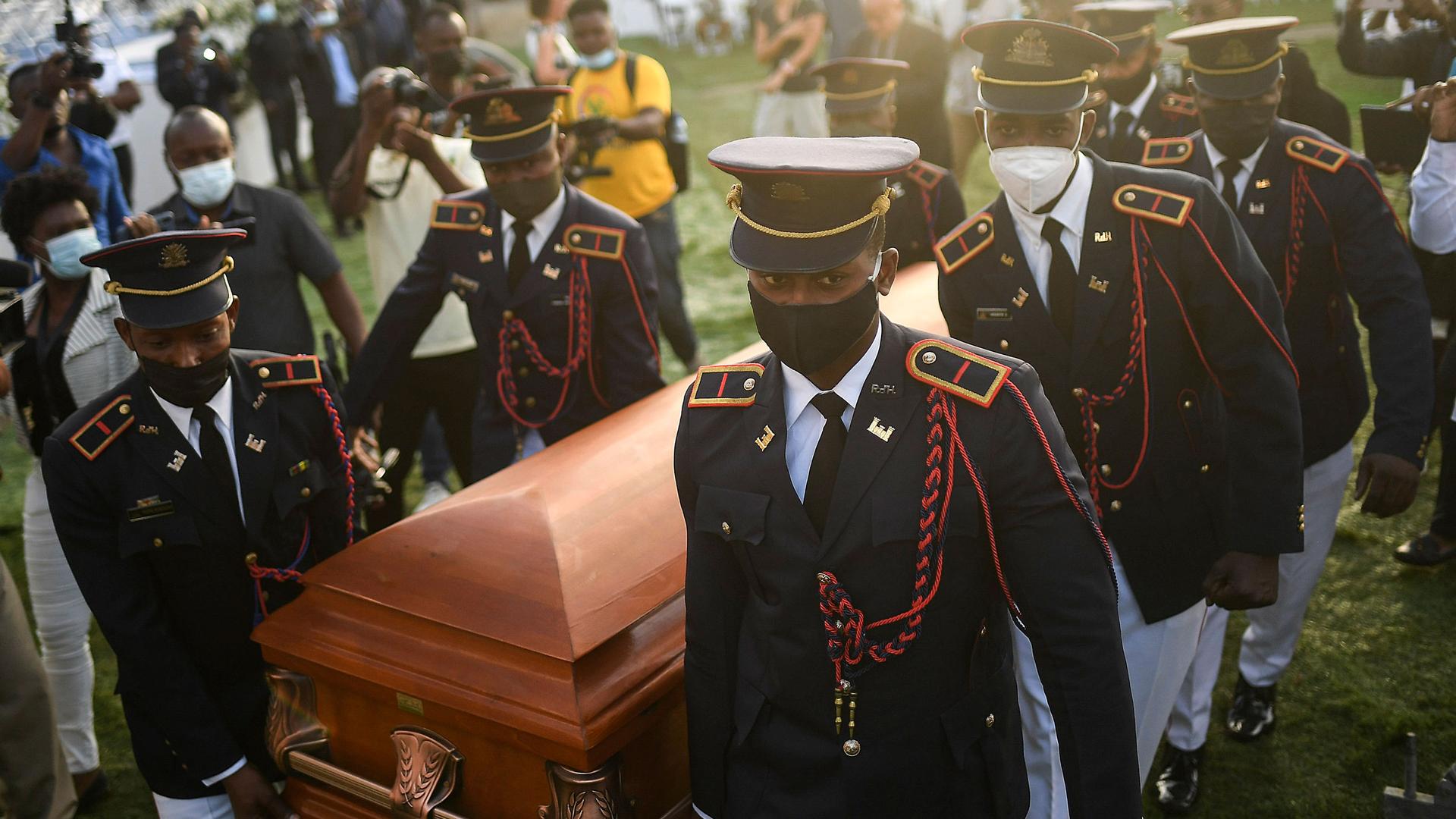Haitian president’s hometown holds funeral amid violence
Police carry the coffin of slain Haitian President Jovenel Moïse at the start of the funeral at his family home in Cap-Haitien, Haiti, July 23, 2021. Moise was assassinated at his home in Port-au-Prince on July 7.
Amid heavy security following violent protests, the body of slain Haitian President Jovenel Moïse was returned to his hometown Friday for a private funeral.
Cries of “Assassin!” filled the air at the arrival of Haiti’s National Police Chief León Charles. Haitians clad in somber suits, shiny shoes and black and white formal dresses shouted and pointed fingers at the neighboring seating platforms where Haitian officials and foreign dignitaries sat above at least a dozen men with high-powered weapons.
“You didn’t take any measures to save Jovenel! You contributed to his killing!” one woman yelled.
On the grounds below, one Moïse supporter threatened Charles: “You need to leave now or we’re going to get you after the funeral!”
Newly appointed Prime Minister Ariel Henry arrived after to cries of, “Justice for Jovenel!”
White T-shirts and caps emblazoned with his picture were distributed to supporters the day before what is expected to be the final ceremony to honor Moïse, who was shot several times on July 7 during an attack at his private home that seriously injured his wife, Martine.
“This is something that will be engraved in our memory,” said Pedro Guilloume, a Cap-Haitien resident who hoped to attend the funeral. “Let all Haitians channel solidarity.”
Moïse’s body arrived shortly after dawn at his family’s seaside property where the funeral is being held. Six officials carried the brown casket up a stage where they saluted it and stood before it in silence for several minutes before draping a large red and blue Haitian flag over it.
Before the funeral began, a man wrapped himself in a large Haitian flag and approached the casket, crying out, “We need to fight and get justice for Jovenel!” Next to him, a man carrying a T-shirt commemorating Moïse joined in as he yelled, “Jovenel died big! He died for me and for the rest of the country … We’re not going to back down.”
The funeral comes days after a new prime minister supported by key international diplomats was installed in Haiti — a move that appeared aimed at averting a leadership struggle following Moïse’s assassination.
Ariel Henry, who was designated prime minister by Moïse before he was slain but never sworn in replaced interim prime minister Claude Joseph, and has promised to form a provisional consensus government until elections are held.
On Thursday, violent demonstrations hit neighborhoods in Cap-Haitien as groups of men fired shots into the air and blocked some roads with blazing tires. One heavily guarded police convoy carrying unknown officials drove through one flaming barricade, with a vehicle nearly flipping over.
A priest who presided over a Mass on Thursday morning at Cap-Haitian’s cathedral to honor Moïse warned there was too much bloodshed in Haiti as he asked people to find peace, noting that the poorest communities are affected.
On Thursday evening, Martine Moïse and her three children appeared at a small religious ceremony at a hotel in Cap-Haitien where Henry and other government officials offered their condolences.
“They took his life, but they can’t take his memories,” said a priest who presided over the ceremony. “They can’t take his brain. They can’t take his ideas. We are Jovenel Moïse.”
Moïse was sworn in as Haiti’s president in February 2017 and faced increasing criticism in recent years from those who accused him of becoming increasingly authoritarian. He had been ruling by decree for more than a year after the country failed to hold legislative elections.
Authorities have said that at least 26 suspects have been arrested in the killing, including 18 former Colombian soldiers. Police are still looking for several more suspects they say were involved in the assassination plot, including a former rebel leader and an ex-senator.
By Dánica Coto/AP
The story you just read is accessible and free to all because thousands of listeners and readers contribute to our nonprofit newsroom. We go deep to bring you the human-centered international reporting that you know you can trust. To do this work and to do it well, we rely on the support of our listeners. If you appreciated our coverage this year, if there was a story that made you pause or a song that moved you, would you consider making a gift to sustain our work through 2024 and beyond?
